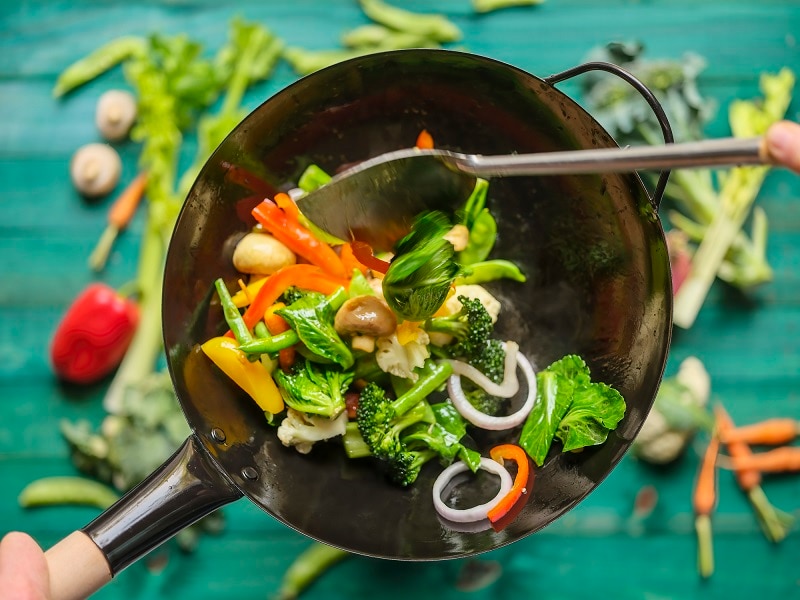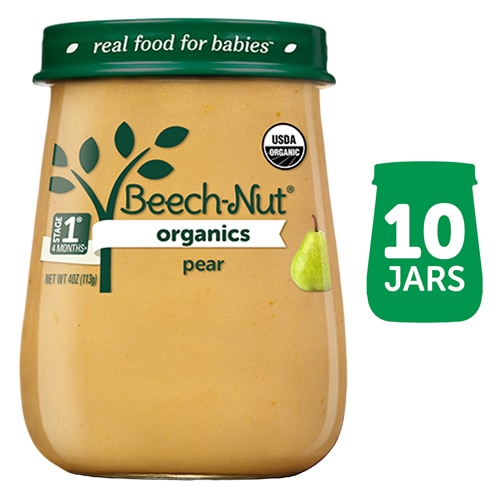If vegetable oil is one of the first things you pull out of your cupboard when you need to cook a meal, you may want to reconsider this habit.
Healthy fats—such as from avocados, nuts and seeds—should definitely have a place in your diet. But
cooking with oil probably isn’t the best way to get the majority of your dietary fat.
Rethinking your old-standby recipes without oil may take a little getting used to. But many chefs have shown it can be done and enables the real flavor of food to shine through.

Reasons to reduce oil in cooking
Many people limit or avoid cooking oil because it’s calorie dense. In addition, oil that has been extracted from its source is no longer a “whole” food. So, oil doesn’t have all the fiber, nutrients and other beneficial components of its source.
For instance,
1 cup of olive oil packs 1,980 calories and 0 grams of fiber. In contrast,
1 cup of whole, green olives has only 196 calories but has 4.5 grams of fiber.
Another reason to revisit your use of cooking oil is that it’s
vulnerable to oxidation, such as when it is exposed to air (oxygen) and heat. That can result in the production of harmful compounds during cooking or when the oil is stored for extended periods.
Higher heat and longer cooking times generally increase the formation of
aldehydes and other harmful byproducts in oils.
Preliminary evidence suggests some of these compounds may increase the risk of cancer and chronic diseases.
For example, a toxin called
hydroxynonenal is created when vegetable oils rich in omega-6 polyunsaturated fat—including soybean, corn, sunflower and canola oil—are fried. This toxin may increase risk of
Alzheimer’s disease, obesity, type 2 diabetes and heart disease.
That said, different oils vary in their vulnerability to oxidative damage.
Though omega-6-rich vegetable oils like soybean oil are prone to oxidation,
extra virgin olive oil (EVOO) is more stable. This is due, in part, to its higher antioxidant content. However, even EVOO generates hydroxynonenal when heated to 400 degrees Fahrenheit. (Just keep in mind, the
temperature on your oven dial is higher than the temperature your food reaches.)
Reusing cooking oil is another underappreciated risk. This is a common practice in restaurants and
South Asian countries. Harmful compounds that can increase your risk of
heart disease and
cancer are formed when oil is reheated. Not only the food but also the
cooking oil fumes harbor these toxins and can be inhaled.
Benefits of cutting back on oil
There has been a
1,000-fold increase in the consumption of vegetable oils, such as soybean oil, in the past century—mostly since 1960.
This increase in vegetable oil usage has paralleled an increase in obesity, type 2 diabetes and non-alcoholic fatty liver disease. Reducing your intake of processed oils may decrease your risk of chronic lifestyle diseases.
Cutting back on cooking oil may also save you money. It’s more eco-friendly, too.
The least expensive oils are generally the ones that have been refined and genetically modified (GMO), including soy, corn and canola oil. These GMO oils are typically contaminated with
glyphosate, a toxic weed killer.
In addition, common vegetable oils
are usually extracted using hexane, which is a nerve toxin. A small amount of this residue may be
left behind in oils. Plus, hexane from oil manufacturing pollutes the air and can be inhaled by workers.
Organic and mechanically extracted oils, such as expeller pressed or cold pressed, avoid hexane and are healthier options. That said, they generally cost more. So, be judicious in your use of oil to help both your health and your pocketbook.
Many people use cooking oil simply out of habit. It’s not that there aren’t ways to sauté vegetables without oil, for example, but it requires trying other methods.
Try these tips:
- Swap water for oil: A tablespoon or two of water can be used instead of oil when sautéing or stir-frying food. Add additional water, as needed, to continue cooking until the food is lightly browned. Stir frequently to avoid burning.
- Sauté with broth: Either buy ready-made broth or make your own. Onions, carrots and celery add great flavor to homemade broth, yet their flavors are mild enough to work in most recipes. Freeze the broth in an ice cube tray so you can use it as needed.
- Cut veggies thinner or smaller: For example, use a spiralizer instead of a grater to prep potatoes for hash browns. Or use a mandoline slicer to uniformly cut vegetables thin or small. They’ll be lighter and easier to cook.
- Use a good quality pan: A ceramic-coated nonstick pan is an eco-friendly choice for cooking foods like pancakes and eggs without oil.
- Try an air fryer: This kitchen gadget will give you the crispiness and crunch of fried foods but in a healthier way. It cooks quickly by circulating hot air around food, such as in a perforated basket. Though the manufacturer may advise using oil for air frying, this isn’t necessary.
How to bake without oil
Many baked foods are traditionally made with oil or other fat. It promotes a pleasing texture. In addition, oil is often used to “grease” pans to prevent sticking. But there are ways around these traditional approaches.
You can:
- Use parchment paper: Use unbleached parchment paper, which has a natural nonstick coating, to line pans when baking. For example, use it when baking homemade fries without oil. Use parchment paper cupcake liners for muffins.
- Swap puréed fruit for oil: You can replace part or all of the oil in baked goods with applesauce, puréed pumpkin, mashed bananas, puréed prunes (mix the prunes with a little water) or similar options. For a shortcut, use puréed baby food.
- Substitute yogurt for oil: Plain Greek yogurt is thicker than regular yogurt and is a good replacement for oil in muffins, quick breads and other baked goods. You can generally replace the oil with the same amount of Greek yogurt.
- Try silken tofu instead of oil: In general, use 1/3 cup of silken tofu (puréed) to replace each 1/2 cup of oil in baked goods.
Topping salad without oil
Oil is nearly synonymous with salad dressing. But this doesn’t mean you should buy fat-free dressings, as the majority of them contain several undesirable additives. Instead, make your own dressing without processed oil.
You can:
- Go creamy or fruity: For creamy homemade dressing, opt for whole-food fats, such as avocados or cashews, which can be puréed in a food processor. For a lighter dressing, use fresh-squeezed fruit juice. For example, try a combo of lime juice with some taco seasoning to top taco salad.
- Use a thickener: For a vinegar-based dressing made without oil, you can add a little xanthan gum. It provides thickening and adds body. It also helps keep herbs and other solids evenly dispersed in the dressing.
- Try alternate toppings: Homemade salsa and guacamole make great toppings for salad. Or, just chop a fresh avocado over your salad for great flavor and to boost the absorption of fat-soluble vitamins in your vegetables.
Even if you’ve already been moving toward a
plant-rich, whole food diet, limiting your use of cooking oil may be one aspect you haven’t tackled yet. As the science around the pros and cons of cooking oil evolves, it’s best not to go overboard using oil.




